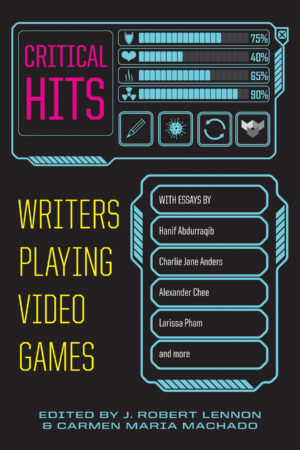Critical Hits: Writers Playing Video Games
edited by J. Robert Lennon and Carmen Maria Machado
reviewed by Hardeep Sidhu
Early in the pandemic, when concert venues, movie theaters, and sports arenas shuttered, millions of people turned to video games for comfort. “We got stuck inside for years and remain kind of stuck,” writes Carmen Maria Machado in the foreword to Critical Hits: Writers Playing Video Games, a new collection of essays she has coedited alongside J. Robert Lennon. “Video games are a way of filling the vessel of that stuckness.” Video games offered an oasis of immersive experience, a way to be alone or to connect with distant friends, a rare opportunity to wander open worlds while ours remained under lockdown.
For much of their history, video games were relegated to a niche pocket of pop culture, often derided as mere entertainment, a waste of time, or a downright corrosive influence. But in recent years, even before the Covid era accelerated the industry’s growth, video games have become ubiquitous. “It is some wonder,” writes Tony Tulathimutte, one of the essayists in Critical Hits, “how a decades-old … industry that outperforms Hollywood could still be considered culturally marginal, but there’s no games critic at the New Yorker, is there?”
Critical Hits is an ode to video games that doubles as an intervention into their cultural sidelining. Lennon and Machado have assembled a delightful, oddball book which they say is the “first of its kind”: a wide-ranging anthology of personal essays and video game criticism. The impressive lineup of writers includes notables like Hanif Abdurraqib and Alexander Chee alongside a stable of newer talents. They cover arcade, console, PC, and smartphone games, arcane older titles, recent indies, and classics from Super Mario Brothers to Red Dead Redemption 2.
Proponents of young art forms often stress new media’s commonalities with established forms—the resemblance of photography to painting, comics to novels, video games to movies. But the writers in Critical Hits don’t get bogged down in rehashing the case for gaming’s legitimacy as art. Instead, they show precisely how video games matter. How does a game’s constructed world and goals uphold or subvert our values? What are the ethical implications of how we treat non-playable characters? What happens when we inhabit characters from cultures, histories, or gender identities that are not our own?
Because this is a group of professional writers—critics, essayists, memoirists, novelists, and poets—the linguistic and narrative qualities of games have an obvious pull. The survival story of The Last of Us resonates with Elissa Washuta as she faces her own mystery illness during the pandemic. Larissa Pham finds that the gaming vocabulary of “health points” and “debuffs” captures her experience of depression like no other. Vanessa Villarreal looks at popular games’ narrative fixation on the Norse myth of Ragnarök, revealing their “connective tissue” with mass shootings and the alt-right. This recurring story, she argues, taps into fears of white apocalypse and the nostalgia for a mythic white past “free from colonial baggage or accountability.”
Beyond language and story, the most compelling throughline of Critical Hits is what Max Delsohn, writing about the revelatory joys of mastering Hollow Knight, calls “an embodied sense of wonder.” “[T]he primary mode of experience” in so many beloved games, writes Nana Kwame Adjei-Brenyah, “is assuming control of an abled figure that is or becomes pristinely equipped to move through the world and physically get shit done.” Throughout Critical Hits, I was reminded of the philosopher C. Thi Nguyen’s description of video games’ unique aesthetic power: in playing games, we submerge ourselves in alternate agencies for a set period of time.
To be sure, this can be a jarring, even painful, experience. Thus nat steele reflects on playing a masked, armored soldier in Halo as both a “trans woman’s childhood in allegory” and also an alienating experience. “[T]rans people,” she writes, “have to find ourselves in stories that weren’t written for us.” In another essay, the Afghan American writer Jamil Jan Kochai describes the acute double-consciousness of playing a white soldier killing Afghans in the hugely popular Call of Duty: Modern Warfare 2. “If I am to exist within the narrative dreams of America,” Kochai writes, “I, as a subject, must destroy myself, as an object, forever.”
Critical Hits is an uncommonly good anthology. The essays collected here are deeply personal, rigorously argued, and, fittingly playful. In one of my favorites, Ander Monson writes lovingly about an obscure game (Alien vs. Predator) for a short-lived, long-defunct console (Atari Jaguar). I’ve never played this game and probably couldn’t find it even if I wanted to. Therein lies Monson’s fascination: this game exists primarily in memory. From this unlikely, particular premise, he gets at universal concerns: the inevitability of obsolescence, our own mortality, the vital way art evokes memories and makes new ones, as happens for Monson when he plays Outer Wilds with his young daughter. Essays like this are a joy to read. And, no less important, they are an invitation to play.
Published on February 6, 2024

